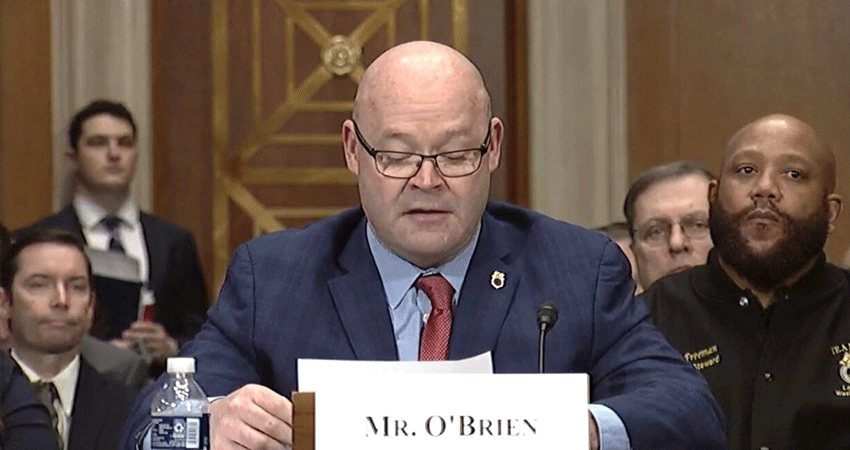Teamsters President Sean O’Brien testifying before Congress in March 2023 (credit: International Fellowship of Teamsters)
The Teamsters union stepped up its rhetoric ahead of the formal start of bargaining Monday for a new contract with UPS, accusing the major carrier of stalling and refusing to negotiate in good faith, while threatening to hold up the process until supplemental issues are settled.
But there appears to be disagreement on the timetable for addressing supplemental issues, with UPS saying they can and often do happen concurrently with bargaining sessions for the main contract.
Rival FedEx, meanwhile, may be looking at a future where the contractor model dominates after its Ground and Express units are finally integrated, which could lead to a unionization effort, Bloomberg reports.
The Teamsters union warned UPS to “stop stalling and negotiate in good faith” on supplemental negotiations, saying that bargaining in the main won’t start “until UPS gets its act together.” The union said those negotiations began in January, with 30 of the 40 items still unresolved. Settling all of those over the next few days would seem a tall order on its face, if the claim is true.
The current five-year contract, expiring July 31, covers more than 340,000 UPS employees, both drivers and warehouse personnel. It’s the largest private sector collective bargaining agreement in North America.
Supplemental agreements are region-specific riders and addendums not covered in the national contract, covering issues like paid time off, discipline language, seniority, overtime and work hours.
“We have clearly stated our intentions to UPS from the beginning that there would be no national negotiations until these regional contracts are completed,” said Teamsters General President Sean O’Brien in a release. “This is not a game. But you wouldn’t know that based on UPS’s behavior. The livelihoods of our members are at stake. UPS delays, disappears, drags its feet and refuses to talk about the real issues that workers need addressed. The Teamsters aren’t going to stand for it.”
In response, UPS appeared to differ with O’Brien and the Teamsters on the supplemental timetable. The company said its negotiating team will be in Washington, D.C. next week ready to work on both the national master agreement plus supplementals.
“We have bargained in good faith since the start and will continue to review and consider all proposals that are brought to the table,” the company said in a statement. “We are committed to reaching an agreement that provides wins for our employees, the Teamsters, UPS and our customers. Taking care of our people and delivering for our customers is our top priority.”
Publicly, UPS CEO Carol Tome has repeatedly expressed optimism that a union settlement will be reached and a messy shutdown avoided.
According to its first-ever jobs and opportunity report, issued in January as O’Brien’s language was heating up, UPS said full-time delivery drivers earn an industry-high $95,000 a year on average, with seniority and tenure factored in. That figure increases to $145,000 in total compensation when health, welfare and pension contributions are included.
The majority of Teamsters working at UPS are lower-paid, part-time warehouse associates handling tasks like loading and unloading packages, with drivers often working up and out of their ranks. They earn an average of $20 per hour, with a guaranteed 3.5 hours per day. UPS said in its report that 14,000 of them transitioned to full-time positions in 2021. The Teamsters want to see those wage rates increase, with more full-time positions created.

